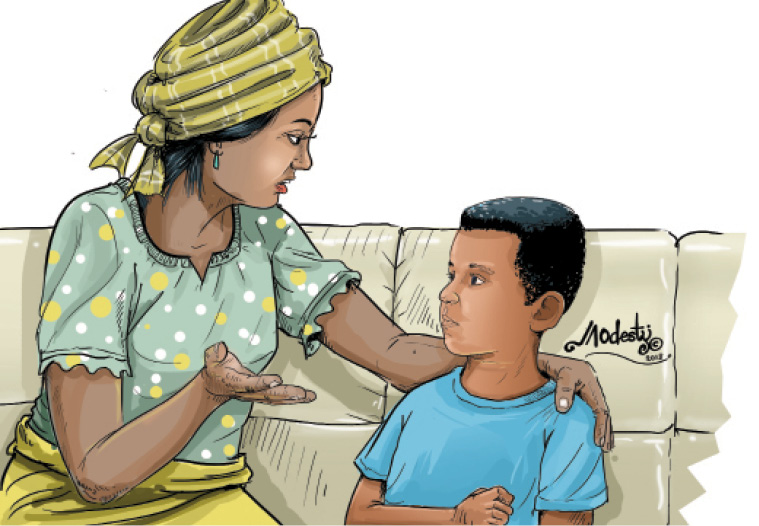Is it right to apologise to your child after disciplining?
Seven years old Ibrahim was moody, and seemingly refuses to mingle with his siblings as they play in the compound. Playing together after school hours when all home works have been attended to is a norm in their home. When the aunt who lived with them observed he has withdrawn himself from his peers, she […]

Is it right to apologise to your child after disciplining
Seven years old Ibrahim was moody, and seemingly refuses to mingle with his siblings as they play in the compound. Playing together after school hours when all home works have been attended to is a norm in their home.
When the aunt who lived with them observed he has withdrawn himself from his peers, she asked him what the problem was that prompted to isolation from others during the play time; he said ‘no problem.’ But the aunt probe further and discovered he was moody because his mother yelled him for misconduct when she went to pick them from school.
Ibrahim told the aunt that the mother shouted at him and she did not say sorry to him later therefore making him sober. He is not alone in this, many children put on attitudes simply because mummy or daddy did not say “sorry” after scolding them.
The trend of saying sorry to children after discipline is suddenly becoming a norm especially among the elites but one wonder if it is really okay to apologise to a child in the process of correcting him or her.
Discipline is defined as a process of teaching a child what type of behavior is acceptable and what type is not acceptable. It teaches a child to follow rules and regulations. Effective discipline uses different tools, like positive reinforcement, modelling, and a loving and supportive family to put the child in proper shape.
Child discipline is the methods used to prevent future behavioural problems in children upbringing. All about parenting blog stated that child discipline is one of the most important elements of successful parenting, yet more and more, parents just don’t know what to do. Discipline (or training) might simply be defined as a process to help children learn appropriate behaviours and make good choices. In addition, loving, effective discipline aids a child in exercising self-control, accountability, and mutual respect.
Through proper discipline, children learn how to function in a family and society that is full of boundaries, rules, and laws by which we all must abide. With it, children gain a sense of security, protection, and often feel accomplishment. Without proper discipline, children are vulnerable to behavioural and emotional problems.
If discipline is a way of correcting the child, why should parents apologise to their wards after exercising one of their rights as a custodian of the child? We often hear the toddlers telling their parents, “I will not be your friend again” while the bigger ones carries mournful look because their parents or guidance have chastised them for misconduct. The Holy Book states that whoever spares the rod hates their children, but the one who loves their children is careful to discipline them.
A guidance and counsellor, Mrs Modupeolami Dada said, many times, she has seen this cycle of event took place between mothers and children where the child misbehaves and the mother gets upset, she disciplines the child and the child in turn gets hysterical, crying; out of sympathy, the mother draws the child close saying, “Sorry” and hug the child while adding why did you do so, so, so and so? You know you shouldn’t have! Sorry, you hear? Don’t do that again ant the child quit crying.
Mrs Dada said though the reason behind this apologies may be linked to the old saying of the elders that, when you use one hand in beating a child, you must use the other hand in drawing the child close because it is said that it is important in maintaining a healthy balance that does not alienate the child, making him/her feel unloved but drawing the child close have nothing to do with apologising for correcting the child on his or her wrong doings adding that saying “sorry” means the disciplinary purpose has been defeated.
She suggested that instead of saying “sorry”, parents should draw the child close for a heart-to-heart talk in a way of letting the child know why he was scolded and let him promise not to repeat such attitude or else he or she would be reprimanded again.
According to her, this seems a much better approach than apologising because apology is tendered when you do something wrong. “Children know this, so, when you go all apologetic to them after what they have done, you send a mixed message to them, no matter how subtle your apology is. Hence, don’t be surprised when the child learns absolutely nothing from the experience.”
Children’s responsibilities
Children under the Child’s Right Act, are also given responsibilities which include working towards the cohesion of their families, respecting their parents and elders, placing their physical and intellectual capabilities at the service of the state and contributing to the moral well being of the society.
They also expected to strengthen social and national solidarity, preserve the independence and integrity of the country, respect the ideals of freedom, equality, humaneness, and justice for all persons and relate with others in the spirit of tolerance, dialogue and consultation.
On their part, parents, guardians, institutions and authorities in whose care children are placed, are mandated by the Act to provide the necessary guidance, education and training to enable the children live up to these responsibilities.
